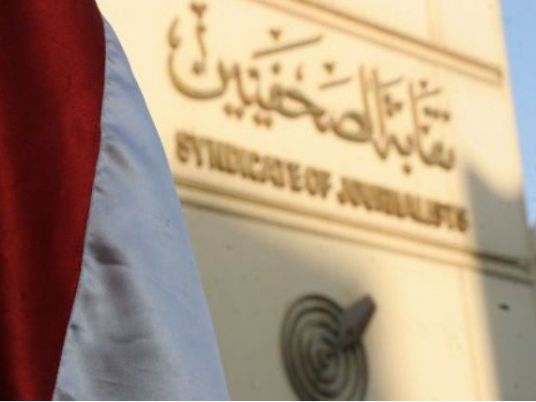
The draft anti-terrorism law approved by Egypt's cabinet last week includes "dangerous articles" which threaten media and press freedoms, the press syndicate said on Monday.
The syndicate's board discussed the draft law during a meeting on Monday, when it stressed that it stands by the armed forces in its fight against "terrorist attacks".
The cabinet passed the draft on Wednesday and referred it to the State Council, after militants in Sinai escalated their attacks on security forces in the peninsula.
The Sinai-based militant group Ansar Bayt al-Maqdis conducted a string of attacks on a number of security checkpoints and a police station on Wednesday, in a failed attempt to take over the Sheikh Zuweid town.
The cabinet said the anti-terrorism law achieves "swift and just deterrence", whereas the syndicate criticised it for allowing imprisonment in cases related to publishing.
Egypt's Transitional Justice Minister Ibrahim al-Heneidi called on the syndicate to submit to the government its recommendations regarding the draft law, in statements to reporters on Monday.
The legislation has yet to be issued by the president to come into effect.
Controversial articles
The syndicate's board said in a statement issued after the meeting it would contact with other syndicates, political parties and civil society organisations to agree on a unified stance to "face the articles which restrict press freedoms" in the draft. The syndicate listed five articles in the draft as such.
Among the most controversial articles is Article 33, which punishes by a minimum of two years in prison the publishing of "false news or data" which contradict official data on "terrorist operations".
Heneidi said the article would come into effect only if four conditions are met: if the case is related to "terrorism", if it is deliberate, if it involves publishing false news, and if such news contradicts official data.
Article 26 of the draft legislation stipulates that any "terrorist crime" committed in saying, writing or any other means is punishable by a minimum of five years in prison.
The same punishment applies to all those who create or use a website to promote ideas or beliefs which call for committing "terrorist acts", to mislead security authorities, to affect "the course of justice" in a "terrorist crime" or to exchange messages or assign responsibilities within "terrorist groups", as per Article 27 of the draft.
The article also stipulates that "illegitimately" accessing a governmental website to acquire, change, erase, damage or forge information on the website for the purpose of committing a "terrorist crime" is punishable by at least 10 years in prison.
Article 29 punishes anyone who collects information on people assigned with carrying out the anti-terrorism law for the purpose of threatening or harming them.
The legislation also bans photographing or recording court sessions in cases related to the anti-terrorism law without the court's permission, as stipulated in Article 37. The ban excludes the National Security Authority.
Targeting freedoms
The press syndicate stressed that it is not against a "modern legislation" which could firmly face "the new wave of terrorism". It added that it was nevertheless tasked with safeguarding the freedom of the press and its independence.
"We stress we will also firmly face any articles tucked [within the law] to target this freedom," the statement read.
The Egyptian constitution states that the freedom of the press is guaranteed. It also states in Article 71 that no freedom-restricting penalty may be imposed for "crimes of publishing." However, it does leave it up to the law to decide on the penalty undertaken for incitement and discrimination.
Press freedom in Egypt has lately come under scrutiny.
The New York-based Committee to Protect Journalists (CPJ) said in a report on press freedom in Egypt published in June that the state's imprisonment of journalists is at "an all-time high". It counted at least 18 journalists behind bars in relation to their reporting.
The group said entire regions in Egypt are "severely under-reported" due to "heavy restrictions" on journalists, naming the Sinai peninsula as an example.
Apart from the Sinai attacks, Egypt witnessed the assassination of its top prosecutor last week.
At the prosecutor general's funeral, President Abdel Fattah al-Sisi vowed to amend laws, saying the hand of "prompt justice" is "tied" with laws, but "we will work on amending the law to achieve justice."
(writing by Rana Muhammad Taha)

